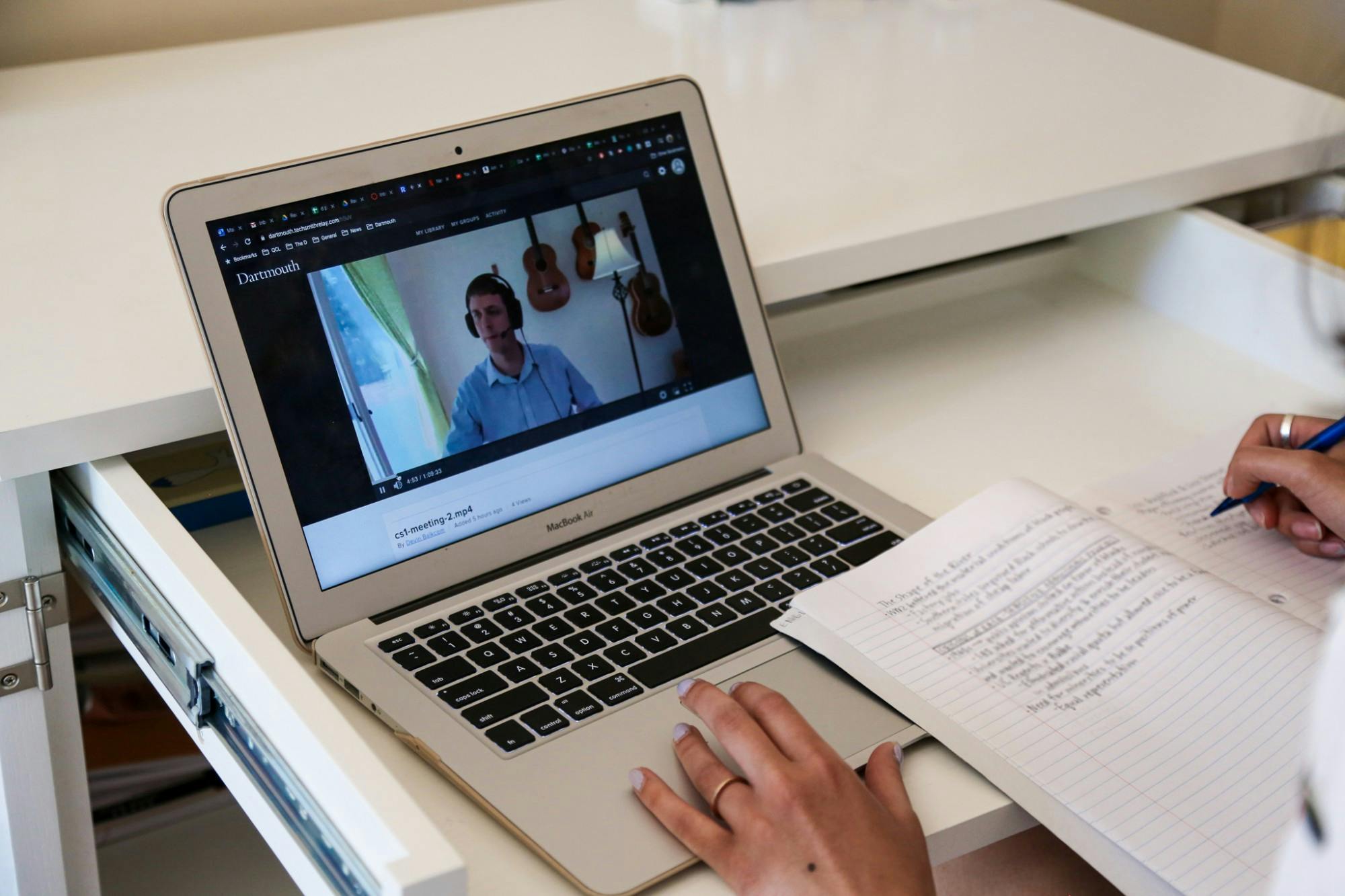Dear ’24s,
Chances are, you didn’t imagine spending your freshman year online and in quarantine. It’s normal to wish you could partake in all the traditions that comprise a normal freshman year at Dartmouth. I’d like to assure you, however, that all is not lost: There are some things that distance can’t disturb.
More than the late nights in the library and the wild weekend shindigs, the immutable hallmark of freshman year is that it’s a time for “Figuring Things Out.” Whether your freshman year is on campus or online, in precedented times or These Unprecedented Times™, it will be spent figuring out what you like to do, how to connect with your new community and how to exist when your world changes dramatically. Though your freshman experience will undoubtedly be different from that of any class before you, everyone at Dartmouth knows a thing or two about navigating uncertainty. There are people in our community who understand what you’re going through, and who are here to help you figure it out.
Let’s get into it: College is weird, and it’s even weirder online. Luckily, since Dartmouth classes have been remote for two terms, we’ve learned a bit about Zoom University. We’d like to offer some advice to you, dear ’24s, so that you may master the art of online classes and find your home at Dartmouth. Through all of the weirdness, we’re here for you. Without further ado, we present …
The ’24’s Guide to Thriving at Zoom University
A Star Is Born: Making the Perfect Schedule
Before you log into your first online class, you’ll need to pick your courses. With hundreds of offerings, only three spaces on your schedule and little knowledge of how the transition to remote learning will affect individual syllabi, course selection can be intimidating. Should you take the newness of college life in stride and try your hand at a subject you’ve never studied, or should you stay true to the things you’ve always enjoyed? How do you know if a class is for you?
For David Millman ’23, being authentic about his interests is the best way to build an engaging schedule.
“I think it’s even more important than usual to take classes that you enjoy,” Millman said. “Since you can’t go to class in person or sit next to your classmates, making sure you really like what you’re taking will help get you out of bed in the morning.”
Millman also emphasized the importance of choosing classes that correspond to your learning style. Whether big lectures or small discussion groups are more your speed, intentionally seeking courses in your prefered format can be the difference between a rewarding remote term and a tedious one.
How do you know if a course suits you?
“Asking professors questions is a very good idea,” said Ben Martin ’22, an engineering major who has seen how widely classes within a single department can vary when adapted for the remote format. “When fall rolls around, professors should know how their classes will be.”
Communicating with professors is an important part of the course selection process for many students, and most Dartmouth professors are more than willing to discuss their term plans; sending an email to a faculty member is a great way to learn more about a class or department, pique your interest and find courses that fit you. Who knows? An enthusiastic professor might introduce you to something exciting and completely new!
In The Zoom Zone: Managing Online Classes
It’s the first day of class and you’ve logged into Zoom. Now what? With a digital barrier between you, your professors and your peers, it can be difficult to stay engaged in online classes.
“It’s so much easier to turn off a computer than to turn off real life,” Millman said. “You can just deactivate your camera and be on your phone.”
No matter how much you love the class you’re in, screen fatigue and virtual disconnect might make you zone out. Don’t feel bad; it happens to everyone. For the past two terms, Dartmouth Zoom veterans have employed a variety of strategies to mitigate screen fatigue and stay focused in class.
“I definitely struggled during spring term. I fell victim to the mindset that if I wasn’t interested in a class, I would just log in and turn my video off,” Martin said.
For Martin, engagement in class requires an active effort. “I think you have to be proactive in being invested in stuff. If you’re one of the people who comes to class and asks questions, professors will help you. I feel that personal engagement with a professor is a great way to stay invested in class, and is the most rewarding part of any course.”
Katie Orenstein ’22, a film modified with theater major who has sought to find the same dynamism over Zoom as in the rehearsal room, emphasized the importance of personal connection in keeping classes fresh.
“I’ve been prioritizing classes with collaborative elements,” Orenstein said. “My comfort level with the people around me affects how excited I am about something. Taking a class, even if I’m not super interested in the subject, is always worthwhile if I have a good time with the professor.”
Even if you’re sailing through classes in a flurry of notes and questions or chatting with your professors every week during office hours, you’ll need time away from the computer. If you’re taking remote classes from a different time zone and struggling to stay awake, screen fatigue can be particularly difficult to manage.
“If you’re living nocturnally, make the most of the few hours of sunshine you get in the afternoon,” said Bryanna Entwistle ’23, who took remote classes from Singapore on a 12-hour time difference during the spring term. “Working in the dark all night is kind of depressing. I definitely recommend carving out time to run, go on a bike ride or just sit outside.”
It’s easy to take for granted the simple act of walking from class to class, or leaving the classroom after a long, stressful work session. Day-to-day movement may seem insignificant on the surface, but its absence can make remote work stifling. Schedule time away from the screen to eat, move and talk to friends like you would during a quarter of in-person classes. If Zoom calls are starting to blend together, try finding a different workspace, a new way of sitting or even changing your clothes between class sessions.
Reaching Out (But Not Literally, Please): Community in Isolation
When you’re physically distant from your peers, even the most lively discussion section can feel lonely. When you’re a freshman joining the Dartmouth community for the first time, that loneliness is compounded. It’s important to remember that behind every Zoom tile, there’s another person feeling the same way. Don’t underestimate the potential for real friendships to form through virtual means.
“Spending time with other people and meeting your classmates is the joy of college,” Orenstein said. “It’s tough to connect with other humans right now, but there are ways.”
By virtue of being a Dartmouth student, you are part of the Dartmouth community. Don’t be afraid to reach out to others in your community for support and friendship. If you think somebody in one of your classes is cool, email them! Chances are, they’re happy to make a new friend too. If you meet an upperclassman who knows a lot about something you’re interested in, don’t be afraid to talk to them.
“People who have been [at Dartmouth] for longer may know more about certain things, like registering for classes or operating Darthub,” Orenstein said pretending as if anyone truly knows how to use Darthub. “That doesn’t mean [upperclassmen] are morally superior to freshmen, or that we have everything figured out. We’re all still figuring things out.”
In times of need, other Dartmouth students can be a powerful support network. Especially for students who struggle with time zone discrepancies and are forced to work in the wee hours of the night and sleep through club meetings, talking to students in similar situations can ease feelings of isolation.
“The international community at Dartmouth is super special,” Entwistle said. “Knowing that other students were going through this was one of the things that kept me grounded during spring term. I definitely recommend reaching out, making GroupMes and finding other international students. People are eager to make those connections, even if they’re upperclassmen. They want to get to know the freshmen and welcome them to Dartmouth.”
Reaching out to others can feel awkward online, but there are students and faculty in every corner of the Dartmouth community who want to hear from you. I can assure you none of your peers will be weirded out or angry if you send them a nice message or ask to FaceTime. For many, regular social interaction is a great way to balance a busy term.
“You’re gonna be fed up,” Millman said. “Make sure you’re talking to people.”
Remote terms can be difficult, and you will struggle in some way. That’s OK, and you are not alone. Trust that somebody in your community loves and supports you, and that you belong at Dartmouth. Trust that many good people and things will come of this term, and that the pandemic will not last forever. In the meantime, we’re here for you. We promise.




